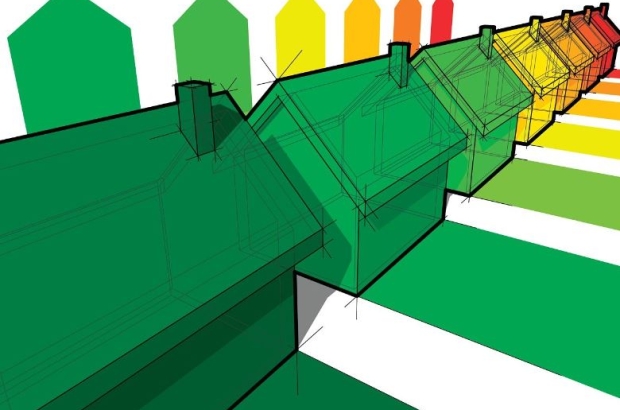- Daily & Weekly newsletters
- Buy & download The Bulletin
- Comment on our articles
Energy certificates for homes under investigation for being unreliable
The energy certificates issued by the Brussels government that often determine whether a house meets certain mandatory standards are being called “unreliable and subjective”, according to critics.
A debate was held in the Brussels parliament regarding the reliability of such certificates, which provide information on the energy performance of buildings, Bruzz reports.
EPB certificates were discussed at length in the environment and energy committee, with questions raised regarding how EPB certificates are calculated and awarded in Brussels.
Owners wishing to offer a building for sale or rent in the Brussels region must have an EPB certificate, which while for now is only required when selling and renting a home or office, will become increasingly important in the future.
“Since the adoption of the Air, Climate and Energy Plan (LKEP) and the Renolution strategy, such a certificate is increasingly required,” Brussels MP Marie Nagy (DéFI) told the committee during debates.
In October, the Brussels parliament decided that poorly insulated rental properties or those without an energy certificate at all could not have their rents indexed for a year, while an advantageous EPB label means landlords can increase their rents.
A property with an exemplary EPB label is also worth more on the market.
“Therefore, it is imperative that these certificates are as reliable and accurate as possible, but up until now, discrepancies and inconsistencies are constantly identified by residents, professionals and TV programmes,” Nagy said, referring to an RTBF investigation in which five EPB certifiers were sent to one house, and each produced different results.
EPB certifiers are trained and recognised by Brussels Environment. With consideration to the surface area of the house, insulation and any solar panels, among other factors, they prepare an EPB certificate which includes the energy class of a home on a scale from A to G.
"The same house submitted to five certifiers received five different values said MP Christophe De Beukelaer (Les Engagés). “Everyone agrees: the EPB certification procedure in Brussels needs to be reformed.”
Echoing the concerns was Cieltje Van Achter (N-VA): “Minister Maron (Ecolo) likes to show off grand ambitions: the targets to reduce CO2 cannot be high enough for Ecolo, but every time I ask for a concrete, quantified substantiation of those ambitions, I get no answer.
"In its report on the new Brussels climate action plan, the Brussels environment council also shares this criticism."
Van Achter argued that the new climate plan also lacks any kind of numerical foundation.
“But the most striking thing is that the ambition remains sky-high, while the measures behind it were all toned down or postponed,” Van Achter said.
“Look, for instance, at the renovation strategy, one of the two big areas on which we have to work in Brussels to reduce our CO2 emissions. The obligation to have an EPB certificate for your home was postponed by six years, to 2031. After the 2030 target, in other words.
"The EPB certificate still needs to be reformed, but this minister seems to need years of study for this. I really wonder what Minister Maron is doing besides selling hot air.”
The EPB is based on a European regulation, but in Belgium it is a regional competence, which means there are differences between the three regions' certificates, for example in terms of energy classes (A to G).
“In Brussels, a home is considered energy consuming from an annual consumption of 276 kWh/m², compared to 426 and 401 in Wallonia and Flanders respectively,” explained De Beuckelaere. “So there are three weights and measures, and Brussels is the strictest region.”
Several MPs are therefore calling for harmonisation between the regions, but Maron says the chances of it coming to that are slim.
“In theory, I could support a harmonisation, but we are limited by the European standard,” Maron said. “That requires EPB classes to be proportional to the average building stock, and that average is not the same in Brussels as in Flanders and Wallonia.”
According to the minister, EPB requirements in Brussels are also not necessarily stricter than in Flanders and Wallonia: “It is true that we have more requirements for new houses than the other regions, but we are also more flexible when it comes to existing buildings.”
Another concern raised by several MPs is the difference between theoretical and real consumption of buildings. According to De Beuckelaere, the theoretical consumption levels (on which the EPB is based) are sometimes twice as high as the real ones, which would create unfairness.
Maron acknowledged these differences, but pointed out that an EPB certificate is not meant to predict the exact consumption of a property.
“The exact consumption depends on how a property is used,” Maron said. “Different households will consume different amounts depending on the number of family members, household appliances, desired room temperature, etc.
"Moreover, consumption can change significantly over the lifetime of a property, making it virtually impossible to include a building's actual consumption in the EPB scheme."
An even more accurate calculation method, according to the minister, would only result in the cost of the certificate going up.
“A balance must be struck between the accuracy of the method, which gives a clear picture of the energy efficiency of the building, and the cost of preparing it,” Maron said.
Nevertheless, the Brussels region has allocated a budget of €4 million for reviewing the EPB score.
“The new method will provide a much more detailed calculation method for existing buildings,” says Maron.
“The priority here is to merge the calculation methods of the three regions, although the energy classes will continue to differ in the three regions.”
The theoretical method should be ready by the end of this year, with the software ready sometime next year.



















